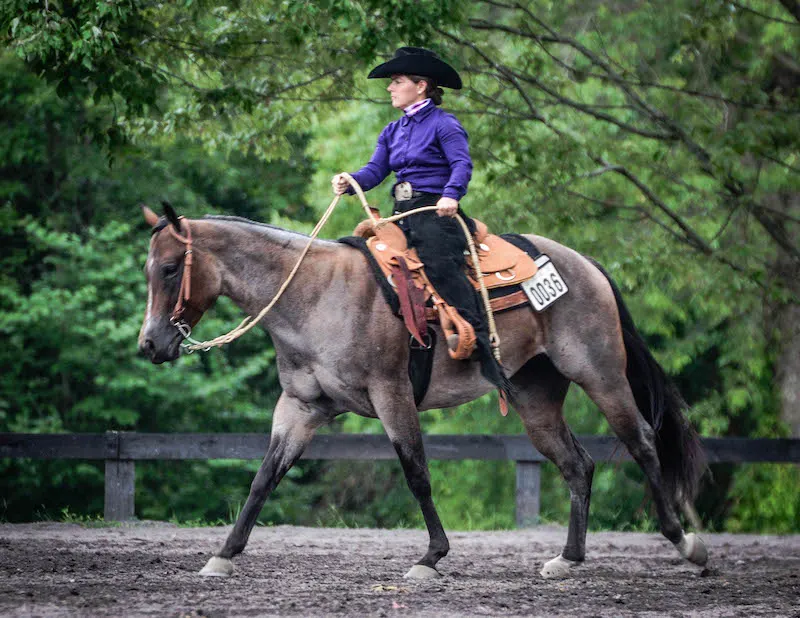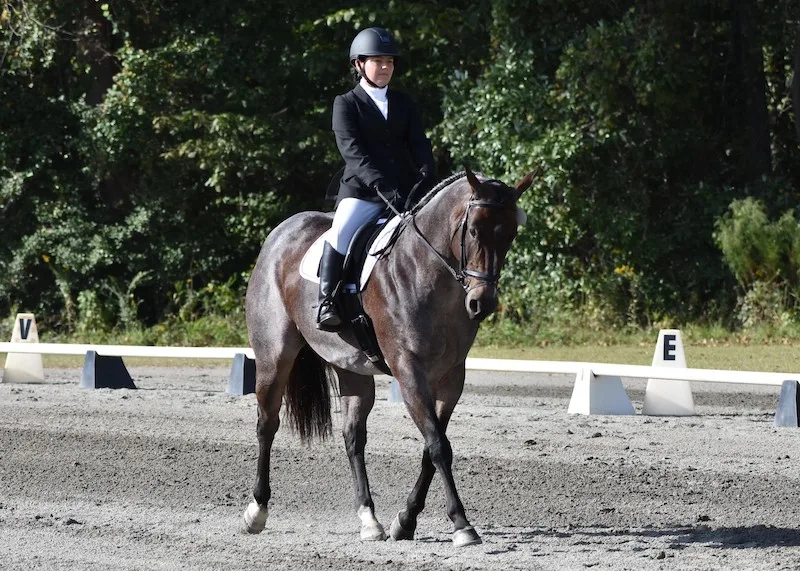When Ashley Noble started showing dressage four years ago after a lifetime on the American Quarter Horse Association circuit, she knew she’d have to make a few adjustments.
First, she had to find something to do with all the extra time she had now that she was showing in only two classes a day instead of 12. She also had to adapt to a quieter, more focused atmosphere, a much prompter order of go, and a field of horses with bigger bodies, bigger movements and bigger spooks than her 15.0-hand Quarter Horse mare, Gimmie Samoa Cookies had to offer.
But one new requirement caught her by surprise.
“Soon after we started showing, I started getting phone calls at 5 o’clock in the morning from people who were worried because my horse was still laying down asleep, sometimes while the other horses were all getting fed,” Noble said. “I’d say, ‘She’s fine, but I’ll come check.’ Then it kept happening during the day, too!
“Now, I just put a note on her stall door that says, ‘She likes to sleep!’ ” Noble joked. “That’s just who she is.”
Noble, 40, works at the Naval Surface Warfare Center in Dahlgren, Virginia. She bought “Lexi” as a weanling in 2009 with plans to train her as an all-around AQHA horse, which means competing in three or more categories like halter, ranch versatility, trail and pleasure. Noble grew up showing in AQHA, palomino and 4-H classes as a kid in Starkville, Mississippi, where she worked off her lessons by mucking stalls at the barn.
When she asked her parents for her own horse in high school, they agreed. But with a catch.
“We never had a lot of money, so the horses we could buy were unbroken,” Noble said. “I would work with trainers, and they would teach me how to teach the horse. I really enjoyed that because you’re not just getting on and learning buttons; you’re putting the buttons there. I love those first 30 to 90 days when every single ride you can see the lightbulbs coming on and the horse really learning and understanding so much, so quickly.”
Noble couldn’t afford to ride much during college at Mississippi State University, where she earned a bachelor’s in software design in 2003. After graduation, she married her college boyfriend, Jon Noble, and turned her full attention to building a career as a civilian computer engineer for the U.S. Navy in Richmond, Virginia.
She earned her master’s in computer science from Virginia Commonwealth University in 2008 and suddenly realized that 10 years had gone by, and she hadn’t found a way back to the saddle.
“I loved riding and showing, and I didn’t quit by choice. It was just something I had to do to get through school at first,” Ashley said. “I always wanted to get back into it. I think it’s hard, the process of becoming an adult. You go out and get a job, then you have bills and obligations, and I wasn’t in a place financially where I could manage showing and owning a performance horse.
ADVERTISEMENT
“But I never gave up on wanting one,” she continued. “Once I completed my master’s degree and got a promotion, I finally felt like I had the time and was financially in a place where I could go back to horses.”
Ashley bought Lexi from her breeder, Nancy Kunkel, as a graduation present to herself. Her bloodlines—Chips Cookie Monster by Zips Chocolate Chip on her sire’s side, and Zippos Mr Good Bar on her dam’s—promised a career in western pleasure (while also providing perfect fodder for her adorable, Girl Scout Cookie-inspired name).

Ashley Noble bought Lexi as a weanling with the intention of developing her into an all-around AQHA mount. Ali Hubbell Photo
But when Ashley went out for her first in-hand competition with Lexi, she found the show world had changed.
“In the 10 years, it had gotten a lot more competitive,” Ashley said. “I didn’t know anybody. The expectations of perfection in the way the horses move, the turnout, everything had gone up a notch from what I remembered. Everybody was working with trainers and putting their horses with those trainers all the time. It was very intimidating going into that as a self-made amateur.”
Ashley soldiered on. By 5, Lexi had matured into a virtually bombproof young horse and developed a penchant for pattern classes, which Ashley described as similar to dressage tests, only shorter.
“You have a series of maneuvers to perform that require a lot more precision and communication with the horse,” Ashley said. “It got me started thinking about dressage, which I always had been fascinated by but never knew how to start.”
Then the AQHA began awarding points for results at U.S. Dressage Federation competitions.
“It was a double win for me,” Ashley said. “Suddenly I had an excuse to show dressage and still get AQHA recognition while I did it.”
Recognizing that Lexi’s downhill, diminutive frame didn’t fit the typical dressage horse model, Ashley started her English riding career at a saddle fitter. The fitter recommended Lorraine Klepacz for lessons, and within a few weeks, Ashley and Lexi had started learning a different kind of pattern work in very different clothing.

Ashley Noble decided to try dressage when the AQHA started awarding points for results in USDF competitions. High Time Photography Photo
“It was definitely harder for me than it was for her,” Ashley admitted with a laugh. “The biggest problem for me has been learning to sit back and have more contact in the reins and push her into that shape. In the AQHA world, they have a looser rein and a long and low frame, so just learning to hold the reins with that amount of contact has been challenging.
“There’s no way I could have gotten anywhere without Lorraine,” Ashley added. “The way that she can see from on the ground what’s happening with the horse and how she’s responding to my aids, that’s really opened my eyes to a whole other level of subtleness and communication that I was previously unaware of.”
ADVERTISEMENT
In three years, Ashley and Lexi climbed from training level to third level, earning Ashley her USDF bronze medal in 2018. Ashley attributes most of their progress to Lexi’s can-do attitude.
Her sleepiness? That’s more of a work in progress.
“She’s a western pleasure-bred Quarter Horse—she naturally wants to be lazy,” Ashley said. “She can move big, but mentally, she just doesn’t want to. Everything is about trying to convince her we do want to go forward. She has a lot of movement in her hocks and freedom in her shoulder, which you wouldn’t normally expect from a Quarter Horse. But encouraging her to be forward and collected at the same time takes some convincing.”

“She’s a western pleasure-bred Quarter Horse—she naturally wants to be lazy,” Ashley Noble said of Lexi. High Time Photography Photo
Ashley had just set her sights on fourth level in 2018 when Lexi sustained a soft tissue injury to her hind leg, which she immediately followed with a severe front leg laceration. The combined rehabbing took a full year.
“I honestly had no idea if she would be rideable or step foot in a show arena again,” Ashley said. “Last year was very tough. Fortunately, Lexi remained her amiable self during the treatment of these injuries.”
Lexi returned to the arena in the spring of 2019, working up from first level again as she gained fitness. But that didn’t take long. She and Ashley completed the year earning a coveted AQHA Versatility Award for earning a total of 65 points in eight different events, which for them included training, first, second and third level dressage.
“As you might imagine, this is not an easy thing to achieve, especially since so many horses today tend to specialize in one or two events,” Ashley said. “I really enjoy competing and riding in different disciplines, so to earn this award is a validation of all that effort.”

Lexi came home with multiple top placings in showmanship, trail, hunt seat equitation and ranch riding at the 2014 AQHA Novice Championships. K.C. Montgomery Photo
Ashley and Lexi are currently schooling fourth level with help from Klepacz and Allison Spivey, both of whom have complete confidence in the little mare’s potential. Overall, Ashley said that everyone she’s met has shared a similar belief in Lexi.
And that belief is catching.
“I’d like to get my [USDF silver medal]—did I say that too loudly?” Ashley joked. “I think she can do it. It requires a lot more focus than what we had been doing, splitting our time between both worlds. I can drop the reins, and she’ll do a western pleasure jog, and I can pick them up and ask her to move on, and she’ll move on, and it’s been a joy to own a horse that’s so versatile. But from now on, other than trail rides, we’re trying to focus on dressage.”















